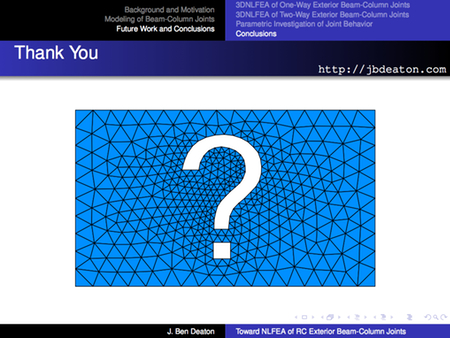The ending of many talks I attend are awkward, abrupt, or ambiguous. Perhaps the speaker just stops talking. Or we’ve probably all witnessed the “non-ending” where the moderator has to walk up and verbally interrupt the speaker. Both scenarios drive the audience mad. Let’s fix this.

The following advice is so basic I can hardly believe I’m taking the time to type it, but you would be surprised how many people don’t do this.
When I give a talk, I have a script
“With that, I’d like to conclude my presentation and thank you for your kind attention
2. If you have questions, I’m happy to answer them at this time. Thanks.”
Concise, composed, direct—that’s all you need. It tells the audience to start clapping, gives the moderator a clear cue, and makes you look like you know what you’re doing.
A few bonus thoughts about your closing slide:

- I think this is one of the few places a creative/quirky graphic works in a technical talk. Opening slides never seem to get the intended comedic response, at least in most talks I see with an audience who doesn’t know you. I created this question mark mesh because it tells the audience I’m a finite element geek, while maintaining a professional air.
- Put your academic website/blog on this slide and point people to it for more information. I will often pre-blog my slides and some links which will be waiting for them. I have previously covered the why and how of academic websites.
- I use the LaTeX Beamer class for slides. This works wonderfully during Q&A; because the presentation outline you see at the top is hyperlinked—I can get to any slide rapidly without leaving full-screen.
-
Credit goes to Dr. Lisa Rosenstein at Georgia Tech for this bit. ↩
-
I stole the “for your kind attention” part from the opening lecture in The Constant Gardener, although I have never had the courage to deliver it in a British accent. ↩